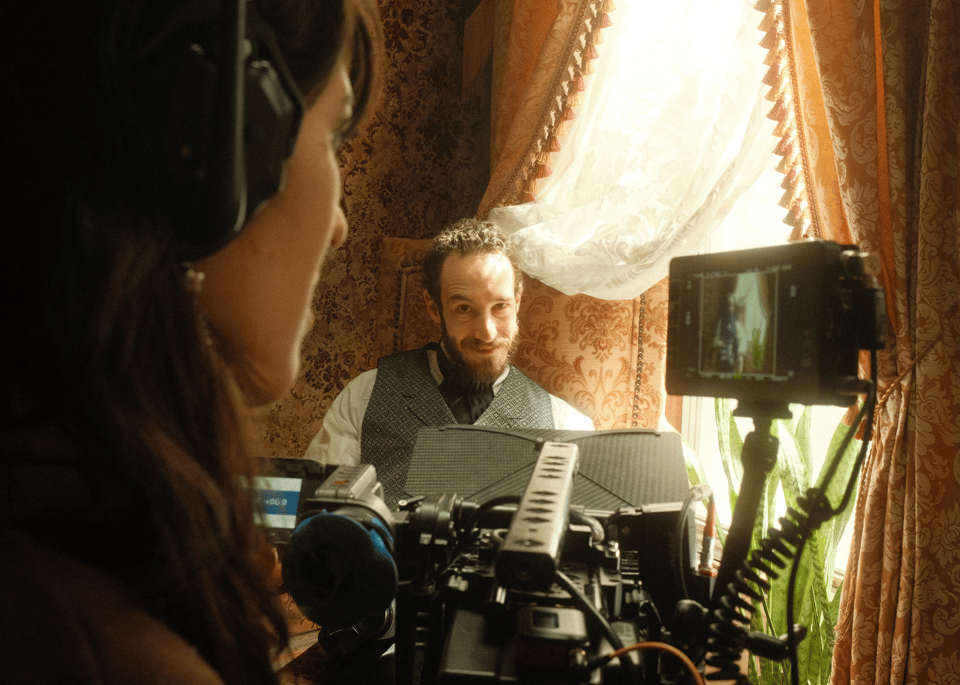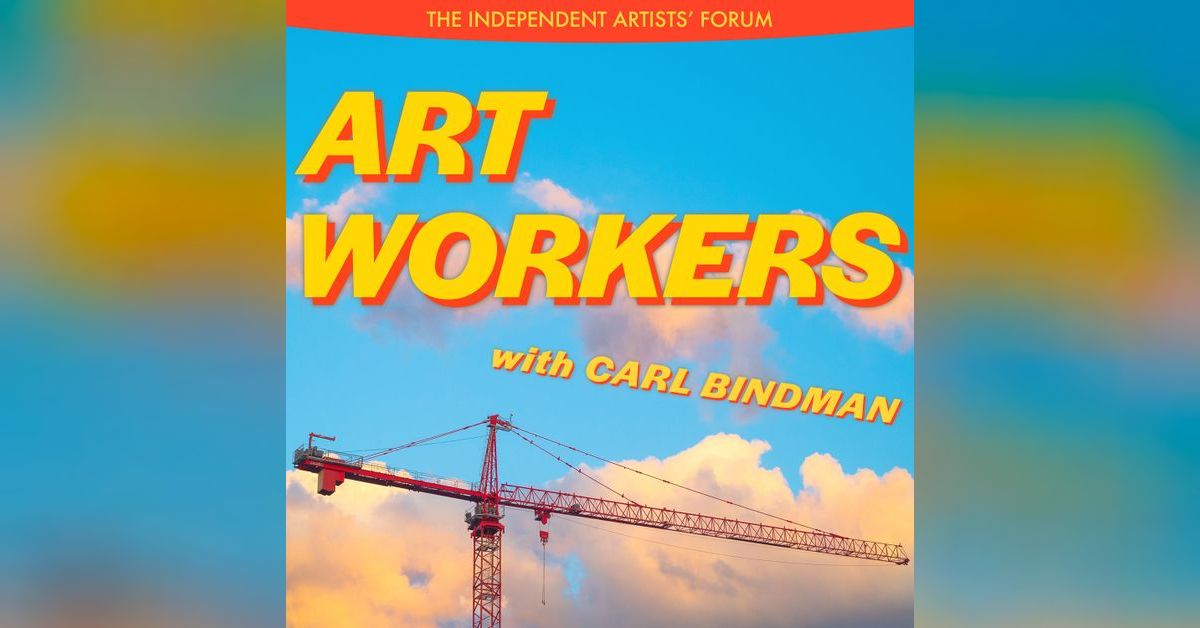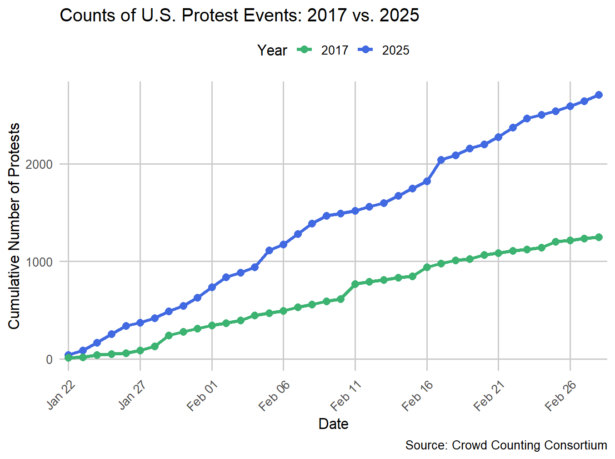I walk from the counter. The bag is warm in my hand. Behind me, the thump of dough as it’s cut and rolled into shape, the hiss of a batch of bagels sliding from peel to oven, the orders, “sésame, une douzaine.” The door jingles, I’m outside. The air is brisk. Mount Royal slopes into view, leafless trees of early spring like down on a young bird, not quite fledgling, a promise. I walk, reach into the bag, take a bagel. Seeds fall from my hand, cascading. I bite. The delicate give of the crust. The sweetness. The smell. The smell! Gold. Warmth. Home.
I can go back to Montreal any time I want.

Shoot Report: Wet Specimen
Last weekend I was on set for Wet Specimen, a short film by Ann Marie Martin. It’s a turn-of-the-20th century period piece about a dad and his daughter and some of the not-great ways he treats her. I played the dad, and for the first time acted with a kid—my daughter, Elsie, played by Rose Mallick. It went great, actually?
There’s one scene in particular where Elsie reacts strongly to a doctor and I run over to silence her, pick her up, drag her away; it’s violent, it’s rough, it’s a bad moment for these characters. I tried really hard, as did everyone on set, not to make it a bad moment for our actor(s). I think we succeeded. It was cool to feel equipped and competent in how to talk about and build a scene like that in a fun and safe way for a child, which isn’t all that different from how it is for adults: clear communication, clear consent, clear boundaries, and a sense of play. Just, more of each.
Looking forward to sharing stills, when I have ‘em!
Fringe Friends
NYC Fringe is starting in a couple days. Some friends’ shows you might want to consider checking out:
The Phantom of the Opera’s Friend by and starring Michael Landes, directed by Catalina Beltrán. A one-man show which I’ve seen develop from funny and good to very funny and good. Opens April 12th.
Uncle Vanya, directed by Emily Ann Banks. Emily is working on a series of spare and haunting adaptations of the Chekhovs; makes a great double feature with Andrew Scott’s. Opens April 4th.
Quacks and Whacks: A Cancer Comedy, directed by Catt Filippov, a fellow Canadian. “Never expected to laugh so much in rehearsals for a show about cancer,” she says. Opens April 4th.
Art Workers: Alex Acosta
It took me long enough, but here’s another episode of Art Workers, featuring my bud Alexandra Acosta. This was recorded in September, lol, but it’s right on time because Screamboat, her feature film debut, opens in theatres next week. We get into that, and lots more, below.
Also, I deleted my Instagram so if you want to keep up with the show be sure to subscribe in your podcast app.

Art Workers: The Independent Artists’ Forum Podcast - Episode 08: Alexandra Acosta | Free Listening on Podbean App
For this episode of Art Workers: The Independent Artists’ Forum, I’m joined by actor Alexandra Acosta. Find Alex at @alexaaacosta Find me at carlbindman.com Produced, engineered, recorded, hosted, and edited by Carl Bindman. Thanks to Louie Zong for the use of his song, “Fragments”.
Some Words About Art and Death
I’m almost 30, which is fun and I am fine with, and I’m not saying that in the way people say they’re fine about something when they’re not. I would never lie to you (unless it made for a better story).
Anyway, 30, as an age, as a number, carries no inherent meaning, we all agree. But we can all also agree it’s used as a social shorthand, as some sort of marker of progress into adulthood. I think I’m figuring out why. 30 is about old enough to have likely experienced actual suffering, and to know that there’s a lot more in store. It means having a sense of the stakes, of what’s involved in being alive—not that life is suffering, but that life has suffering, and there’s no way around it. The consolation to getting comfortable with pain is that lot of art makes way more sense to me now.
For unimportant reasons, I’ve been hovering around Three Sisters, by ol’ Tony Chekhov. Reading it recently, watching it, I felt like I was accessing the emotional reality of the thing for the first time, rather than appreciating on an intellectual level its construction, or its fine words, or its, I don’t know, historical-material importance in the development of modern drama. I was just there with these people, these actual people, who were so god damn sad. Compared to when I encountered the play last, years ago, the characters and I got to share from a mutual understanding of human experience, rather than how I used to watch them from the outside (this change of frame also made the jokes actually funny, go figure). I’d finally been inducted into the appropriate mystery to access the secrets of the play, and thus recognize the art for the art, and not just the craft. The art being, of course, the truth. The truth being, of course, that we’re never going to get to Moscow.
My grandmother, Suzanne Brohman, died last week. I will miss her very much.
Because it’s hard to enjoy the acting when the theatre is on fire, and also the only way I can organize my thoughts about this stuff is by writing it out and once it’s written I might as well share it.
A bizarre side effect of the daily increases in repression, corruption, and evil in America is that the bar for dissidence has lowered to an absurd degree. It’s very silly to think that huge swathes of normies are now de facto thought criminals by virtue of expressing mild skepticism toward, like, bringing back racial segregation as official policy, or the kidnapping of regime enemies (or random tourists, or refugees), or the extermination of the Palestinian people. All that’s needed to accidentally or deliberately become a Certified Enemy of the State is to hold a tiny sliver of humanity in your heart, or else righteous hate for the worst among us, and be willing to act accordingly.
And yet! So low a bar has not been cleared this past month by some of the more powerful people stalking those vaunted halls of American democratic and civil society (fascists themselves notwithstanding). Bon voyage in particular to Columbia University president Katrina Armstrong for her cruise on the good ship S.S. Quisling! May her days be long, that she may drink deeply and bitterly from the well of shame. My wishes for Senator Charles Ellis Schumer are less generous, if I can be honest.
This is the part where I ask you New York constituents to politely encourage Chuck’s exile from public life, if you please.
The cowardice of the most powerful appears to be a fact that won’t be solved in the short term. Oh well. New things are happening. Look at this chart, from this article.

That’s great! That’s great news! And this is a measurement of street action, not even accounting for more formal stuff like the massive AOC-Bernie rallies, which I personally find enormously relieving. Somebody with institutional power doing something morally obvious, politically effective, and with an appropriate feeling for the moment? Is that allowed? I owe no allegiance to any American political party but that sure seems to me like a better way forward for Dems than the alternative strategy of “how many vulnerable communities in our coalition can we shank for good headlines from professionally braindead pundits and a theoretical polling bump from folks who won’t vote for us anyway.”
But the protests are a big thing, for a million reasons that I won’t get into (this time). On a personal level, as I see my rights as a non-citizen eroded by the hour, every American in the street sends me a meaningful message of solidarity, a sign that people are willing to take real risks on my behalf. It’s not yet enough, partly because the point of view that there is some level of “enough” civic engagement seems wrong to me, but also because there does remain the yawning chasm between this growing popular movement (even in the face of increased danger to its participants) and the craven handful of figures who could put an end to this whole situation at any moment with, like, 500 available tools in that there U.S. Constitution. That gap will close as elected reps catch up or are replaced, as long as the movement grows. General Strike when?
Okay, since I hear you begging, I’ll briefly touch once more on the theory of mass action. The modern state has tremendous but limited resources. Because of those limits, the best tool for control is the threat of violence, since actual violence is expensive and localized and unsustainable: cops cost a lot of money and have physical bodies that can only be in one place at a time, while trials and prisons are even more expensive (hence the benefits of a volunteer militia and a lawless deportation machine for a regime anticipating heavy resistance, but I digress). By establishing a credible enough threat of retaliation for any given dissident action (speaking out for Palestinians, for example), the potential future actor is deterred without the having to burn additional resources. In other words, state power is a high-stakes bluff, and if enough people call it at once, there are simply not enough enforcers to stop them all. Each additional person in each additional crowd provides more protection for every other person and crowd. This principle applies equally to institutions and speech acts, which is why it’s a losing game for any entity invested in the future to cede any ground to the current regime, ever, on any front.
That is, of course, hard. Sometimes it’s too hard, and the little cop who lives in the mind wins the day. When an institution loses the moral battle, the result is catastrophe. For an individual, it’s tragedy. I didn’t go home for my grandmother’s funeral because I was afraid that I wouldn’t be able to get back into the States; because the little cop who lives in my mind also happens to actually live at the border, where justice goes to die. Cool stuff.
Anyway. It’s election time in Canada. Wish us luck.
I open up my wallet / And it’s full of blood.
Carl

Four Blanches | Defector
The first time I saw Blanche DuBois, she was just words on a page. I was a teenager with somewhat sophisticated reading tastes, and so I’d bought a skinny paperback copy of the Tennessee Williams play A Streetcar Named Desire. I moved through it quickly and at least partially recognized its greatness, but I was […]

There's No Justice Without Power - by Hamilton Nolan
A rich guy's lesson for the left.
You just read issue #19 of The Carl Bindman Newsletter. You can also browse the full archives of this newsletter.

Add a comment: